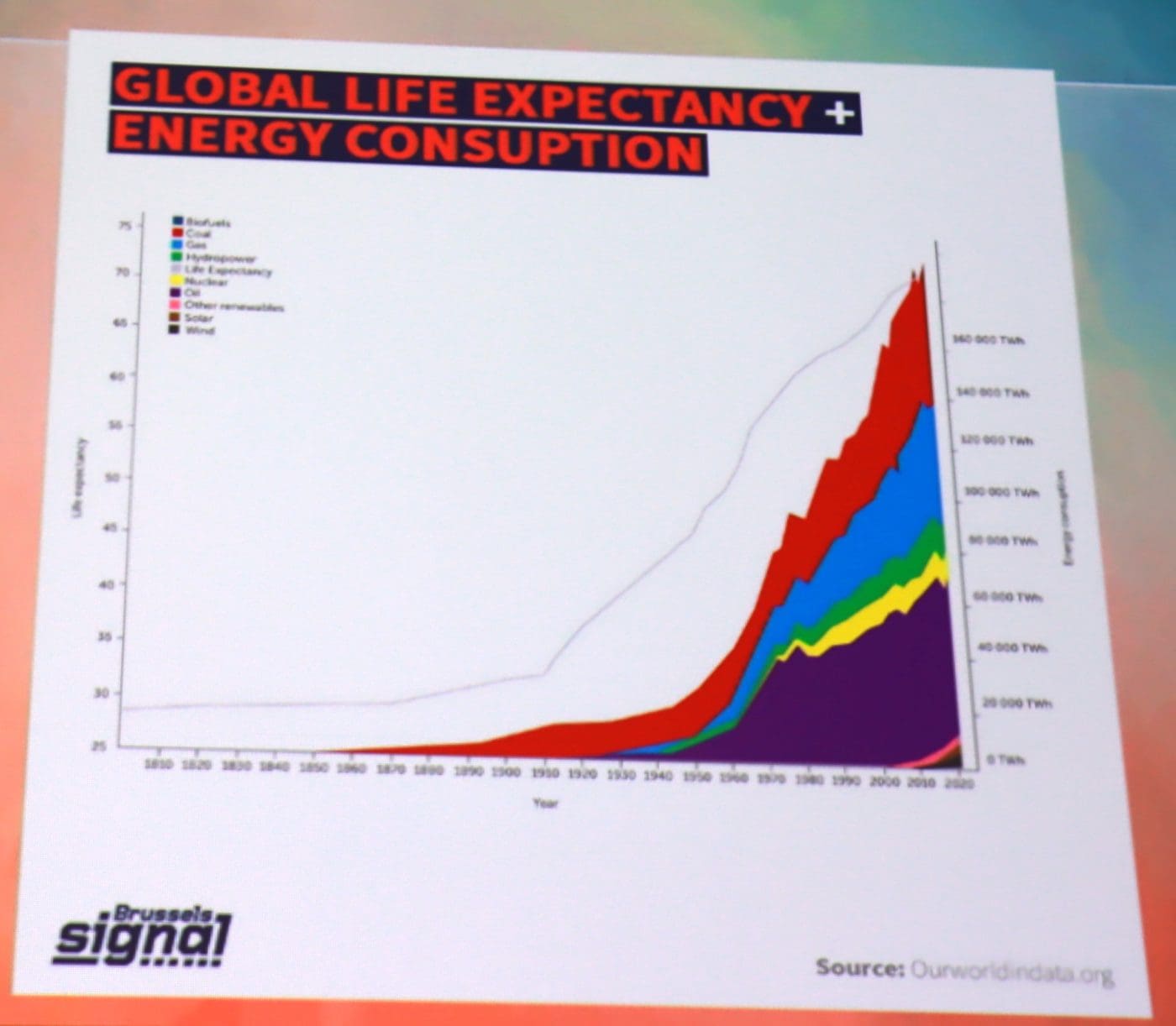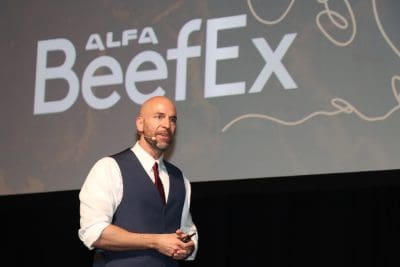“The Worst Mistake in the History of the Human Race” is how one of the world’s pre-eminent intellectuals describes agriculture in a published media article.
“These are the people who you are up against,” Professor Ralph Schoellhammer, a political scientist and commentator from Austria, told a room full of cattle producers at this week’s BeefEx feedlot sector conference in Brisbane.
Professor Schoellhammer spent two days visiting Queensland feedlots before addressing the BeefEx event. He noted in his speech that one topic continued to emerge in conversations with producers he had met.
“I hear you say we have to take the challenge up and confront them rationally, science based, we have to show them what the science is.”
This approach was “very well intentioned and very honourable”, he said.
“But I think this is missing the point.”
“This is because the goal of those that you are up against is not a rational argument.
“You are up against a new form of religion that believes that agriculture is a bad thing. That energy production is a bad thing. That modern society and modern civilisation itself is a bad thing.
“It is an ideology. This is not driven by science, this is not driven by a rational approach.”
He said he had enjoyed meeting Queensland cattle producers and lot feeders, describing them all as “all fantastic people” performing an essential job for society: “You are custodians of the land you are working on, you are custodians of civilisation.
“What you are doing is not just producing protein, you are not just producing calories, you are directly contributing to the maintenance of civilisation.”
But he noted that many of the efforts industry was undertaking to demonstrate its sustainability would not appease its ideological opponents.
“I think you do fantastic things. I saw for example you are taking good care of methane emissions, of CO2 emissions, you try to work with new forms of alternative and renewable energies and this is all great.
“But let me give you a warning, no matter how good you are, no matter how many of these problems you are going to address, they will find something else to come after you.
“Because it is not about methane, it is not about the CO2, it is not about environmental degradation.
“It is about the ideology that is at war with progress itself, that is at war with the pillars of civilisation itself.”
‘The most important graph in human history’
Professor Schoellhammer presented a chart showing a direct correlation between human life expectancy and access to affordable energy over time.
 “There is in almost all of human history nowhere such a clear correlation, and may I say causation, between access to energy and the maintenance of human life.
“There is in almost all of human history nowhere such a clear correlation, and may I say causation, between access to energy and the maintenance of human life.
“I don’t have to tell you calories are just another form of energy.
“Energy is life, lack of energy is death”.
Energy including calories was “the one thing” that had liberated humanity from many of the negative experiences humans have endured throughout history.
“Pretty much anywhere in the world where human suffering is concentrated these days, from modern forms of slavery, from low life expectancy, from child labour, from forced marriage, from all these things, it is in areas where there is no energy available.
“So energy including calories, is not just good for prosperity, it is also a liberator.”
But Australia’s energy producing industries of mining and agriculture were increasingly coming under attack on ideological grounds.
In 2009 Australia was capable of refining 734 barrels of oil per day, but now refines just 235 barrels of oil per day.
In order to produce grain, the agricultural sector needs diesel.
Australia was now in the “completely absurd situation” of exporting natural gas and oil and then reimporting diesel, jet fuel and gasoline.
One reason the United States was doing so well, Professor Schoellhammer said, was because “there is a very big difference between what the United States does and what the United States says.”
“I know in public the American politicians will tell you how committed they are to climate change, how committed they are to abandoning fossil fuels, how committed they are to energy transition.
“But the reality is that in the last 10 years when it comes for fossil fuels the US have added two Saudi Arabias to the global market.”
Energy in the US was “dirt cheap”, especially in areas like Texas. This had a direct impact on the US agricultural industry, because “if energy is cheap, production is cheap”.
“The important thing about this is this is not happening because of the laws of physics.
“This is because of the laws of politics.”
Australia’s mining and agricultural sectors had world leading standards in safety, sustainability and quality.
If Australian politicians respond to ideological interests and decide to make those products unavailable to the world, countries wanting them to improve their own standards of living would just buy from somewhere else, produced to lower standards.
“The question for Australia is – will you use your high standards, your high quality, your high safety standards and support these countries in this endeavour to do it in the most sustainable, the most advanced, the most sophisticated way?
“Or will you say, you know what, we have no interest in this. We don’t want anything to do with you.
“Because what they are going to do is they will go somewhere else. They will get this meat from countries, from places who are not as sophisticated as you, that aren’t as sustainable as you, who are not as safe as you.
“Australia might say we will not produce fossil fuels, we will not produce coal, we will not produce gas, we will stop mining wherever possible. These countries will not care.
“It is going to happen somewhere. But it is going to happen dirtier, it is going to happen less safe, and it is going to happen less sustainably.
“The idea must always be that those who are capable of doing things best should do more of it.
“So Australia should do more mining, more agriculture, Australia should produce more beef because you do it better than anybody else.”
Professor Schoellhammer said Australia had all the resources it needed to build its own nuclear power or renewable energy generators.
“Renewable energy – fantastic stuff, I am all for it. But I have to ask you, why are so many solar panels that you use in Australia made in China? Why are so many wind turbines made in China?
“You could make them yourself.
“But this would mean that you would have to take advantage of the resources you have.
“Australia could have electricity and energy so cheap that the world would envy you.
“But it is a political decision that prevents this, not the laws of physics. Everything is here.”
Journalist and conference MC Peter van Onselen asked the Professor for his advice on how to deal “with an activism you can never convince of the adequacy of your practice”.
“Do you seriously try to engage with them, or do you seriously dismiss them with your evidence, noting you are never going to win them over anyway?”
“You will never convince Greta Thunberg that modern agriculture and mining and other things Australia is efficient at are good things,” Professor Schoellhammer said.
“(But) there is a large part of the younger generation of Gen Z that is looking for, let’s say, an ideological home.
“I think showing that when it comes to agriculture and all these other industries, they are actually very cool.
“It is cool work. As I said before, this is making modern civilisation possible. The very fact in the 1880s people spent 90pc of their income on food, and the other 10pc on shelter and heating material. No body in this room spends 90pc of their income on food.”
He added that it was also important not to disengage with key stakeholders and audiences, because, “influence comes with engagement”.
“Engagement is the best way towards influence,” he said. “Just to disengage I think is very bad, because somebody else is going to jump in.”


Dr Ralph for Prime Minister please.
Great advice for sure, but we need the people who are trying to ruin this country would realise that mining & agriculture are the two major industries that we need to keep the whole country alive .
Also, wind & solar are never going to be able to provide enough reliable power to re-establish a manufacturing industry in Australia.
There is a real problem with the central argument here: that in essence it is ‘ideology’ against science. Of course, the speaker is a ‘political scientist’, and politics is sadly in the business of creating false dichotomies. The science the dear professor gives scant attention to is that of climate change and the catastrophe that we as a global family are already living with. Of course Australian farmers are making great strides in becoming more sustainable, with regenerative practices now moving closer to centre stage. Such progress, guided by science and evidence-based practice is essential. To place mining (an essentially extractive industry) and agriculture (a traditionally regenerative industry) in the same camp and use very selective data to drive what is itself an ideological narrative is disingenuous. By all means, continue to drive evidence-based innovation, but let’s not pretend we can keep extracting fossil fuels with immunity just because we are good at it. Predatory delay by the mining sector is extracting profit at the expense of future generations and the ecosystems that keep the earth alive. The professor is correct on the issue of renewable energy and its great potential in Australia. The tragedy is, as long as environmental science is treated as a political football with ‘us and them’ narratives selling papers and votes, nothing will change, except the severity of the floods, fires, droughts, pandemics, storms and heatwaves.
Great advice
I totally agree with Dr Ralph what a breath of fresh air with common sense.
James, there is a risk associated with the publication of this common sense, truth, logic and fact, because if any of it reaches certain ears in Canberra, the good professor might find his visa has been cancelled!!!!
Some very sound advice from Prof. Schoellhammer . The most important quote for our industry to remember is “influence comes with engagement” . We must continue to put our practices forward and demonstrate the facts and science of our industry despite the emotional “religion” aligned against us .
From memory one article by Terry McCann said “ food is people energy”
Agriculture is simply people energy , agriculture is in the energy business